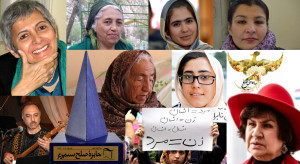4th International Simorgh Peace Prize Awardees
Armanshahr/OPEN ASIA
4th Edition – December 2015
Kabul-Paris, 10 December 2015
Armanshahr Foundation/OPEN ASIA announced the recipients of the 4th International Simorgh Peace Prize awards on the 67th Human Rights Day during the “Human Rights Week” (7-10 December 2015) in Kabul.
This 4th round, women who are true protectors of peace in three countries located at the heart of Asia – Afghanistan, Iran and Tajikistan – were recipients of the awards; women who despise war-mongering and stand up to it by their civic and sustained initiatives; innovative women who resist the despotic and war-afflicted world and give us hope to continue the struggle to change the unjust relations and serve equality.
The awardee women are:
AFGHANISTAN
Horia Mosadiq
In appreciation of more than two decades of human rights activities on the national and international levels
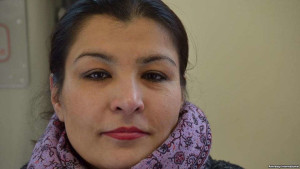
“There were times that I had to make very tough decisions, to sacrifice, to let go and to compromise and despite all the hardships I never gave up.”
Horia Mosadiq was born to an educated and liberal family in Herat in 1973. Following the invasion by the former Soviet Union, she and her family moved to Kabul in the early 1980s, where she lived until 1995. After the outbreak of the civil war, she migrated to Pakistan.
As a human rights activist and journalist, she has spent the last 22 years of her life working in the media in the fields of human rights, women’s rights and transitional justice in Afghanistan and the region. Mosadiq has worked as Director of Human Rights Research and Advocacy Consortium (HRRAC), Media Commissioner for Afghanistan Elections Commission 2005, Senior Advisor to Afghanistan Independent Human Rights Commission, and Observer in the Constitutional Loya Jirga of Afghanistan in 2003- 2004. She represented Afghanistan in the 51st session of the UN Commission on the Status of women in 2007 and chaired the human rights and civil society panel in Paris Conference, civil society side event, in 2008.
Horia Mosadiq is the author of more than 100 articles and opinion pieces on human rights, women rights and transitional justice in Afghanistan.
Since September 2008, she is working at Amnesty International, International Secretariat, as Afghanistan Researcher.
Mosadiq has helped with founding various human rights and media organisations and associations in Afghanistan, including the first Network of War Victims in Afghanistan, which defends the persons whose rights have been violated in the past.
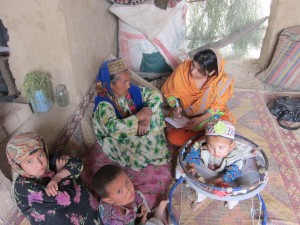
She was awarded the National Human Rights Award of Afghanistan in 2007. In 2011, the British Glamour Magazine recognised her among 50 bravest women of the world. In 2012, she received the Women’s Rights Defender Award from Amnesty International.
She says: “I conducted a research on the situation of the Internally Displaced People (IDPs) in 2012, which prompted the Afghan government to develop its first IDPs National Policy in order to tackle the issue. I did another report on civilian casualties caused by the USA in Afghanistan and the US government started an investigation into some of the cases we reported on allegations of torture and killings against civilians.”
ـــــــــــــــــــــــــــــــــــــــــــــــــــــــــــــــــــــــــــ
Auntie Sakina
In appreciation of a life-time of bravery and courage in breaking sexual taboos
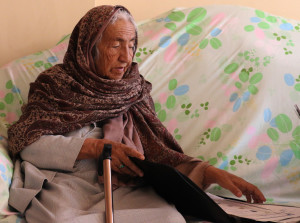
“In the entire Herat province, there is no other women who would serve the people like me.”
Auntie Sakina who says she is the daughter of Hajji Ahmad Ali from the Babaji neighbourhood, is a militant woman from the era of the experience of liberation from the former Soviet Union. She says her house served as the base for her struggle for many years; she heard the people’s problems and helped the militants and deems her main duty to be “serving the braves of this land.” During the war, she fetched bread and food for the militants, washed their clothes and served their needs.
“Under the Taliban, I was a hero. There was nobody in the Babaji neighbourhood to stand up to them other than me. When they asked me if there were any mujahedin in my house, I answered: No, they are only destitute people who have taken shelter with me.”
The Taliban members once went to her house to arrest her. Her family members were worried for her, but she told them: “I wish I would be killed for the people, but I am not worthy of it.” Finally, one Taliban member told the other not to bother Auntie Sakina, because she was a good woman whom the people respected. In those days, Auntie Sakina went on the mosque’s rooftop and called for prayers.
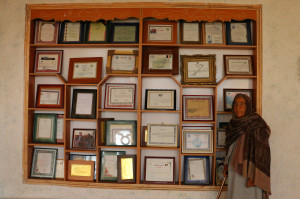
After the fall of the Taliban, her house retained its character as before. “The people would come to me as the neighbourhood’s elder. I had inherited all the lands in the Babaji neighbourhood from my father. They would ask for land and house and I would provide for them.” She built a mosque in a part of her father’s lands and dedicated some land to the “Martyrs” Charity to build a school for orphans. This fulfilled her true wish of “seeing children smile in school.” Streets of the neighbourhood were paved and electrified, all through her efforts.
Auntie Sakina meets with the Police Commander of Herat and other officials once or twice a week to follow up people’s problems. She is also active in charity work. If there is an argument in the neighbourhood, her son would take everybody to the mosque to settle the dispute. In her old age days, her son is following in her footpath. She has two sons and a daughter who died.
ـــــــــــــــــــــــــــــــــــــــــــــــــــــــــــــــــــــــــــ
Maryam Durani
For her resistance and initiatives to make voices of women heard from Kandahar
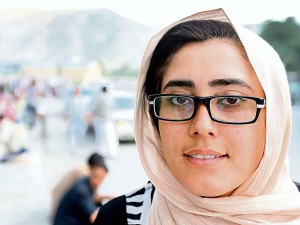
“As an Afghan girl, I tell the women to have confidence and know that they can change whatever they want to.”
Durani is the first Afghan who has been awarded the Freedom of Speech medal. She has also received the “Peace Generation” award of the UN. She is the founder of Khadija Kubra Association for culture and director of “Merman” (Women) Radio in Kandahar, which is a special women’s radio. She says: “I had reached the conclusion that activities of Khadija Kubra association are not sufficient and it is necessary to make women’s voice heard through a medium.”
Having lived in migration in Pakistan and Iran, she returned to Afghanistan in 2003. Khadija Kubra Association was founded in 2003 with the goal of empowering women, where women take part in literacy, sewing, carpet weaving, flower making and cosmetic classes. The Association has also established the “Kandahar Women’s Advocacy Network” to defend women’s rights. The Association offers short-term interest-free loans to women to build a home or to start up a business and one of its achievements is the organising of the first Women’s Handicraft Fair in Kandahar. Durani established the first women’s institute for evening classes in 2014, where women are taught computer, English, management, accounting, leadership and journalism. She also set up a women’s library in Kandahar in 2015.
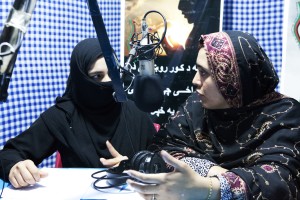
Her political activities date back to 2004, when she entered the provincial council. She was re-elected in 2009 and carried on until 2014. She has been the target of two suicide attacks and was wounded once. She lays special emphasis on women’s “economic independence” and deems their presence in the provincial councils as a great change.
Time Magazine chose her as one of the 100 Most Influential People in the World in 2012. ـــــــــــــــــــــــــــــــــــــــــــــــــــــــــــــــــــــــــــ
Farkhonda Rajabi
An outstanding example of young girls who employ culture and knowledge to promote enlightenment
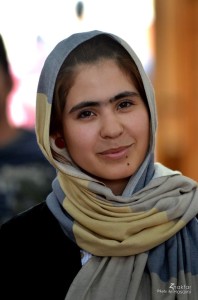
“Building a healthy society with educated women.”
Rajabi is a journalist born in Mazar-e-Sharif in 1990. She went to school under the new regime and published the first student newsletter in the framework of the Ministry of Education of Balkh province when she was studying in the ninth grade. The newsletter formed the backbone for the “Parto” monthly and cultural house, an institution that trained many cultural activists. In his “History of Literature in Balkh,” Saleh Mohammad Khaliq described the Cultural House as a source of a new wave of female poets, writers and cultural activists.
Rajabi is a co-founder and member of Board of Directors of “Civil Activists for a Sustainable Development,” which she set up with four “like-minded” colleagues in 2011. They have organised numerous national and international programmes in collaboration with Finland and Germany among others.
She is currently busy with the education of rural girls in Balkh province, including building of schools, organising computer training classes and teachers training centres. The educational programmes have the perspective of “Building a healthy society with educated women.”
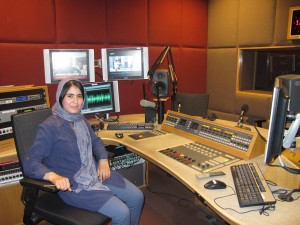
Rajabi says writing keeps her alive and that is a love that encouraged her to continue her Dari Persian language studies. She graduated from BBC Academy and an anthology of her stories has been published with the title of “Cold Claws.” She has worked for many national and international media during her career and has been working for “Women and Peace” for more than six years.
ـــــــــــــــــــــــــــــــــــــــــــــــــــــــــــــــــــــــــــ
Praised: Vaheed Kaacemy
For his efforts to bring message of peace and friendship through music and research.
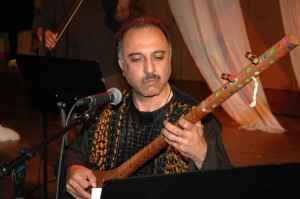
Vaheed Kaacemy is a singer, performer, composer and music scholar. He is mainly known for his reproduction of folklore songs and his research on the nationwide local music of Afghanistan. He examined the theories of music in Afghanistan from 2001-2011 and then set out to talk to artists, or families, survivors and associates of artists. The outcome has been specialised writings on instruments and songs in Afghanistan in Persian and English. He is referred to as one of the youngest composers in the history of Afghanistan.
Kaacemy was born to a family well known in Afghanistan’s traditional music in Kabul in 1958, graduated from Kabul University in Dari Language and Literature and then took up music. He learned the fundamentals of the oriental and Western music with celebrated masters in Afghanistan and founded the Shine pop music band in 1977, which – along with “Four Brothers” and “Stars” – is considered as a milestone of modern music in this land.
His book, “Zeer o Bam, a Study of Traditional Music from Badakhshan, Herat and Badghis”, which Armanshahr published, is the outcome of 10 years of research and interviews with traditional artists, performers of old instruments and folklore singers of Afghanistan. In the book, he has discussed the traditional music of Badakhshan in Pamir and Takhar, has introduced the styles and works, instruments and artists in both areas and discussed folklore songs. He also portrays the relationship between oral literature and music in different regions and reviews the history of music in this land, in particular the local music of Herat. The concluding chapter is an illustrated narrative of traditional music of Badakhshan, Herat and Badghis.
Kaacemy has published more than 15 music albums and other songs. His work frequently concerns women and girls. Some of his works deal with the political, social and cultural background of Afghanistan. His most important works are: “Alphabet” for children, “Lonely Afghan, you’re lost to the wind” (a mourning for the people who suffered in Afghanistan), a mourning song for Ahmad Shah Massoud, “Alas, Eagles’ Nest burnt up” (a Lullaby for Afghan children, sung by Master Mahvash), “My Eyes” (for the blind)…
Wahid Kaacemy was celebrated as a “Star of Music” in the 2007 Noor TV Festival (USA), and in the 2008 Ariana TV Festival , along with other artists such as Master Mahvash, Ms Ghamar Gul, Farid Zaland, Master Khial, and Ahmad Zahir.
ـــــــــــــــــــــــــــــــــــــــــــــــــــــــــــــــــــــــــــ
IRAN
Mehranzi Kar
For a life-time of defending equal rights for women and freedom
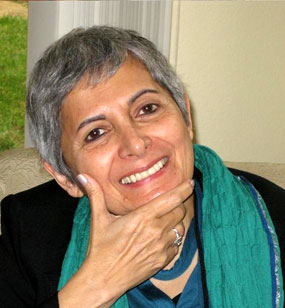
“Women shall decide Iran’s future.”
Mehrangiz Kar, lawyer, writer and human rights activist, is one of the most influential women in the domains of democracy, human rights, women’s rights and rule of law in Iran. She has critiqued and challenged the legal and social structures in Iran through her books and articles, as well as by representing her clients in courts.
Mehrangiz was born in Ahvaz/Iran in 1944 and is a law graduate from Tehran University. She started writing for the Iranian press before the February 1979 revolution. Her lawyer’s licence was issued three months prior to the revolution. Her involvement in court cases prompted her to “decide to expose the law.” Her books that have been published in Iran, include: “Angel of Justice and Patches of Hell”, “The Quest for Identity: Iranian Women in History and Pre-History”, “Women in the Labour Market of Iran”, and “Children of Addiction.” She has also published numerous articles on legal topics concerning women’s rights.
Having spoken on the need to amend the Iranian Constitution at the Berlin Conference 2000, Mehrangiz Kar was detained for two months upon her return to Iran and was charged with “acting against the national security”, but was released as a result of international outcry. She was then sentenced to 4 years imprisonment, which she appealed. Subsequently, she left Iran with the Indian Government’s help to seek treatment for her breast cancer and took up residence abroad. In all the years in exile, she has been campaigning for women’s rights in Iran. Since leaving Iran, she has published two other books: “Holy Necklace” and “Insurgency: A Women’s Narrative of the Iranian Revolution.”
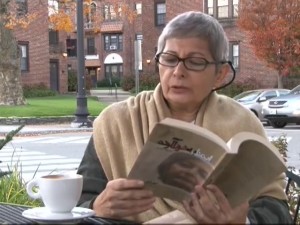
In 2002, Human Rights Watch awarded her the Hellman/Hammett grant, which is allocated to writers who have been victims of political persecution. Her other awards include:
- 2000 Oxfam Novib/PEN Award of PEN Club, Netherlands
- 2000 Donna Dell’anno Award of the Conseil De Lavallee Consiglio Regionale Della Valle D’Aosta (Italy)
- 2001 Freedom-to-Write Award of PEN New England (Massachusetts, U.S.)
- 2002 International Human Rights Prize, awarded jointly by the Human Rights Institute of the Bar of Bordeaux and the European Lawyers Union
- 2004 Human Rights First’s annual Human Rights Award
She currently works in Pembroke Center for Teaching and Research on Women in Brown University.
ـــــــــــــــــــــــــــــــــــــــــــــــــــــــــــــــــــــــــــ
Praised: Civic Pervasive Campaigns of Iranian Women
For being a unique example in Iran and the region, striving for equality, justice, freedom, and elimination of discrimination.
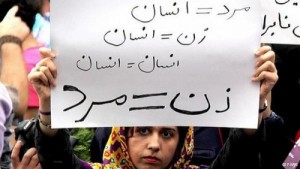
By launching different peaceful civic campaigns for gender equality, Iranian women have made a great contribution in spreading information and raising consciousness. The first campaign took off against discriminatory laws and gradually extended to other issues dealing with various grievances of women.
One of the most important campaigns is the internationally renowned Campaign for Equality otherwise known as the Campaign of One Million Signatures to Change Discriminatory Laws, which was launched in 2006 and is still collecting signatures to change anti-women laws, despite the numerous crackdowns and detention of many activists.
On awarding the Simone de Beauvoir Prize to the One Million Signatures Campaign in 2009, Julia Kristeva, the renowned feminist philosopher and chair of the Prize Committee said: “The One Million Signatures Campaign is a new innovative movement, because it has not taken shape around a progressive famous woman. It is a widespread movement and the women involved in it meet other women, discuss things with them, go house to house and explain women’s rights to every one of them. In this way and through the Internet, they are creating a vast intellectual network that comprises every type of women, from the low-income to the well-off, and this is exactly in line with the spirit of Simone de Beauvoir’s work. By awarding this prize, we wish to encourage these women and display our enthusiasm, love and solidarity for them.”
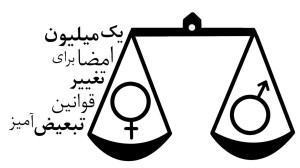
Other campaigns emerged later. “Stop Stoning Forever” was one of the campaigns that brought activists together to fight for abolition of stoning in law and practice. Its members argued that stoning existed in the laws, despite denials of the authorities. These campaigns have launched numerous websites to carry out their work, among them: Iranian Women’s Association (Focus on Iranian Women), Feminist School, Campaign for Equality, Women’s Awakening (Bidari-Zanan), Bridges for Women, Zannegaar (Women’s writings) and Meydaan-e Zanan (Women’s Field), Shirzanan (Lionesses) .
Not only have Internet and social networks helped the work of such campaigns, they have also led to the launching of numerous single-issue campaigns. For example, “My Stealthy Freedom” (Stealthy Freedoms of Iranian Women) has publicised women’s discontent with compulsory hijab. There are others, which use the social networks to promote women’s rights. There are also information networks, which operate separately toward the same goal. “No to Compulsory Hijab”, “Equality of Men and Women”, “Change the Male Image of Parliament”, “Support Women’s Presence in Stadiums”, “Daily Feminism”, “Safe Home” are but a few of such campaigns.
ـــــــــــــــــــــــــــــــــــــــــــــــــــــــــــــــــــــــــــ
TAJIKISTAN
Golrokhsar Safieva
Known as the “Mother of the Tajik Nation”
In praise of a powerful and knowledgeable poet and writer, the heart of whose writings beats with the social, political and cultural developments in her country and the region.
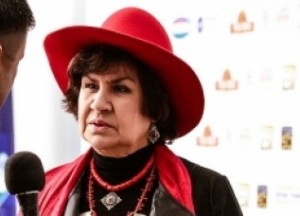
“It is our duty to retain the huge legacy of our great ancestors. Unfortunately, we have been separated from each other in the past two hundred years. I wish to emphasise that we are a nation that is connected through this thought and language, even though we are separated by force.”
Golrokhsar Safieva is a Persian-language poet, novelist and literati of Tajikistan, whose brilliance and concerns have earned her the epithet of the “Mother of the Tajik Nation.” She has endeavoured to promote the self-consciousness and national identity of Tajikistan for many years. Literature is not the only domain, where she has been present. She was elected as a Member of Parliament of the former Soviet Union and supported Tajikistan’s independence.
Safieva was born in 1947, when her mother died and she grew up in orphanages. She believes the hardship of that period helped her to understand life and try to become self-made. She started writing her poems about the “spring” at the age of 15: “My first poems were about the spring and my last ones will also be. I have not seen a greater miracle than the spring in my life.”
She studied Language and Literature at the Tajikistan State University and worked as a journalist, director of the Press Department of the Central Committee of Komsomol in Tajikistan, editor-in-chief of the Pioneer newspaper and then became Secretary of the Writers Association of Tajikistan.
Her life was full of ups and downs after Tajikistan’s independence and during the civil wars. There were 16 assassination attempts against her and she survived them all. As she puts it, “When a gun was aiming at me, I stayed alive within and did not give in. As the poem goes, ‘If my keeper is the one I know/He shall keep the glass next to a stone.’ There is also a Russian proverb, which says: ‘One who is destined to drown, shall not burn in fire.’ Once, somebody threatened me with a weapon. I told him: ‘There is no need for this state-of-the-art weapon; one needle would kill me.’ He changed his mind.”
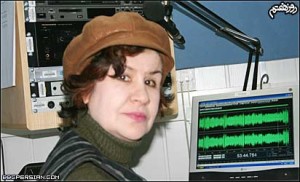
Golrokhsar is in love with the Persian language and script. She is also a critic of the absence of serious relations between the three regional states – Iran, Afghanistan and Tajikistan – and believes that the substitution of the Persian script with Cyrillic in Tajikistan has created a big gap between the Tajiks and other Persian speakers. Safieva opines: “It is our duty to retain the huge legacy of our great ancestors. Unfortunately, we have been separated from each other in the past two hundred years. I wish to emphasise that we are a nation that is connected through this thought and language, even though we are separated by force.”
Hafez and Bidel Dehlavi are Golrokhsar’s role models in poetry. One of the most celebrated poets of Tajikistan, she has published scores of poetry anthologies in different countries. She has also translated works of Lorca, Camus, Faiz Ahmad Faiz, and Bergolis.
Having been a full member of the Writers Association of Tajikistan since 1971, Safieva was awarded the Tajikistan’s Komsomol Prize in 1975.
ـــــــــــــــــــــــــــــــــــــــــــــــــــــــــــــــــــــــــــ
Mehrenegar Bahranova
In appreciation of a life-time of social work for women and children
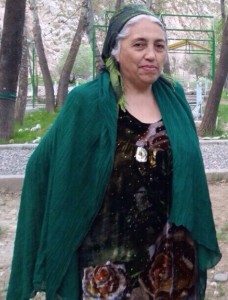
Mehrenegar Bahranova is a woman born in the east of Tajikistan, who may be regarded as an ambassador of peace. She opens the closed doors to the people, hears their sorrows, listens to orphans and organises survivors of the war.
Mehrenegar was born in Gharm in 1954 to a large family with well-reputed parents. Her mother was acquainted with traditional medicine. However, her parents were killed during Tajikistan’s civil war (1992-1997). She started working at young age in a sewing factory in the Soviet Union. After a while, she was promoted to the post of management in different sections and also became representative of the Councils in five districts as well as leader of the regional women for employment and always had a solution for every problem.
During the war, when people lived in hunger and fear, when the number of casualties was rising, she took a courageous initiative by assuming the responsibility for 180 orphans in her home town. She employed the women widowed as a result of the war at the sewing factory and used the resulting income to attend to the war-afflicted children. The orphanage became a safe haven for women, mothers and children.
Elementary classes were also organised in the orphanage for the children. Bahranova taught them poetry and helped them enter the Teachers’ Training University.
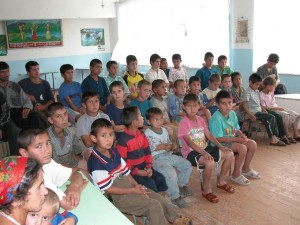
Mehrenegar is also well known in Europe and the West. The French filmmaker Christophe de Ponfilly depicted her hard work and brilliant personality in his documentary “Femmes d’Asie centrale” (Women of Central Asia). She is now a member of the Board of Directors of Welfare Department in five districts and is still helping the socially vulnerable people.
She is a poet and has a pleasant voice. She has been writing and singing poetry about women, her mother, war and the people of her land. She has recorded her poems in a hand-written booklet.
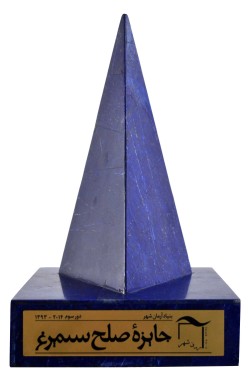
Armanshahr Foundation/OPEN ASIA: contact@openasia.org
Armanshahr/OPEN ASIA is a member of the International Federation for Human Rights (FIDH).

